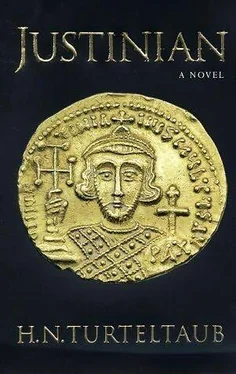Harry Turtledove - Justinian
Здесь есть возможность читать онлайн «Harry Turtledove - Justinian» весь текст электронной книги совершенно бесплатно (целиком полную версию без сокращений). В некоторых случаях можно слушать аудио, скачать через торрент в формате fb2 и присутствует краткое содержание. Жанр: Историческая проза, на английском языке. Описание произведения, (предисловие) а так же отзывы посетителей доступны на портале библиотеки ЛибКат.
- Название:Justinian
- Автор:
- Жанр:
- Год:неизвестен
- ISBN:нет данных
- Рейтинг книги:3 / 5. Голосов: 1
-
Избранное:Добавить в избранное
- Отзывы:
-
Ваша оценка:
- 60
- 1
- 2
- 3
- 4
- 5
Justinian: краткое содержание, описание и аннотация
Предлагаем к чтению аннотацию, описание, краткое содержание или предисловие (зависит от того, что написал сам автор книги «Justinian»). Если вы не нашли необходимую информацию о книге — напишите в комментариях, мы постараемся отыскать её.
Justinian — читать онлайн бесплатно полную книгу (весь текст) целиком
Ниже представлен текст книги, разбитый по страницам. Система сохранения места последней прочитанной страницы, позволяет с удобством читать онлайн бесплатно книгу «Justinian», без необходимости каждый раз заново искать на чём Вы остановились. Поставьте закладку, и сможете в любой момент перейти на страницу, на которой закончили чтение.
Интервал:
Закладка:
Finding my way back to the xenodokheion in the darkness was another victory, one that at the time seemed as large. On leaving the brothel, I paid a couple of coppers for a torch- nothing came free there- to light my way southward, but the cursed thing went out before I was halfway there, leaving me alone in a darkness almost as stygian as that inside the chamber where I had coupled with the whore.
I stumbled on- literally, seeing (or rather, not seeing) how full of stones and mud-filled potholes the streets were- by God and by guess and by occasional glimpses of stars overhead through rents in the clouds scudding past. So long as I kept going south I told myself, I would eventually come upon the monastery to which the guesthouse was attached.
Such assurances are often less than reassuring even by light of day. In the chilly blackness of night, I might as well have been a little boy murmuring charms against the monsters that dwell only in his imagination and so can follow him even under the blankets of his bed. I was looking around for monsters, I must say, but, as much by luck as by design, found the monastery instead.
When I walked in through the door of the xenodokheion I found Myakes, wearing a sword I had not known he possessed and about to come out after me. "Where were you?" he cried out on seeing me, his tone quite different from that by which a subordinate customarily addresses his superior.
One of the monks was hovering in the chamber: "Never mind," I replied in dull embarrassment, not wanting to wreck the reputation for piety I had built up since arriving at the monastery.
Myakes, though not always what one would call quick-witted, was in certain matters no fool. "Oh," he said, realizing where I must have been, and then, a moment later, "Oh" again when he figured out the likely reason I had had to wait so long before faring homeward. "Hope it was worth it." God bless him, he sounded almost as matter-of-fact as the bouncer had been.
"I think so," I said. The monk looked from one of us to the other in confusion, unable to follow our elliptical conversation. Just as well, I thought.
MYAKES
Easy, Brother Elpidios, easy. We don't ask guests at our xenodokheion here to be saints, now do we? Of course we don't. Every man's a sinner, right? The only perfect man was the Son of God.
Yes, Justinian went out and fornicated with prostitutes. Why are you asking me when he admits it himself? Yes, I know he was the man who fought so hard for the canons of the fifth-sixth synod that condemned brothels and those who kept them. No, that didn't stop him. Pretty plain it didn't stop him, wouldn't you say?
A hypocrite? Justinian? Less so than most men I've known. But he was a man, and even then well on the sunny side of thirty. Once his wounds healed up, his body drove him, same as it does any man that age. Yes, he fell into sin every now and again. You get rid of every man who's fallen into sin that way every now and again, all of a sudden the world starts looking like a pretty empty place.
Me, Brother? What did I do when we were up there in Kherson? Oh, this and that. I was working a lot of the time, remember. Was I working all the time? Now, what ever would you mean by that, Brother Elpidios?
JUSTINIAN
I did not pander to my lusts. Every so often, though, when they grew unbearable, I would ask money of faithful Myakes and go off after sunset to slake them. Some of the other women at the brothel gradually came to accept me, so I did not have to rely entirely on the complaisance or availability of that one.
As I have already said, days and weeks and months in exile began to flow into one another, with little to distinguish any particular day from any other. Only the unusual was worthy of note, and little enough of that happened. A few times a year, a ship from Constantinople or one of the Anatolian cities of Romania, Sinope or Amastris mostly, would tie up in the harbor. Then we would have a brief orgy of catching up on news from the wider world, much of it old news by the time it reached us.
Avid to find out how the Roman Empire was faring, I pestered captains and sailors alike for word of what Leontios was doing. For the first year the usurper's fundament defiled the throne, the answer was, as best I could tell, that he did nothing whatsoever. This in no way surprised me, being in perfect accord with the character Leontios had previously exhibited.
"Everything is peaceful," the seafaring men would say, perhaps hoping to wound my spirits by showing that the Empire was doing well without me.
If that was their intent, it failed. In calm weather, a ship's captain may fall asleep whenever he pleases with nothing evil befalling his vessel. But if he is asleep when a storm blows up, the ship will go to the bottom before he can wake and try to make amends for his carelessness. So I judged it would be with Leontios, and my judgment was vindicated.
That, however, as yet lay ahead, for news from the Roman Empire trickled in slowly. News from all over the world trickled into Kherson… slowly. It lay on a trade route that stretched east all the way to the land of Serinda, whence we Romans learned the secret of manufacturing silk during the reign of the Emperor for whom I was named, and west to the island of Britannia and even to another island beyond Britannia, of which geographers may speak but of which I was previously ignorant.
Most merchants travel back and forth across a single section of the trade route, but some, pulled by greed or the desire for adventure, wander far from their homes. In taverns in Kherson, I met men from India- the eastern India, the one Alexander conquered, not the one also known as Ethiopia- and Persia, from Germany (the source of so many barbarous tribes that have harmed us Romans) and from this distant island I mentioned, which is called, I think, Ibernia.
"No, I've never been to Constantinople my own self," a traveler told me in a hideous mixture of Greek and Latin enlivened by a barbarously musical accent, "but I know a man who has. A priest, he was, out of some little town in Gaul-"
"Arculf!" I exclaimed. The odds were against it, I knew, but he was the sole priest from a little town in Gaul I had met in the imperial city.
And may I be condemned to the eternal fires of hell if the merchant did not nod. "Aye, that's the man," he said. "A good and holy soul he is, too."
"Yes," I said, agreeing with him completely. "How did he come to distant Ibernia?"
I needed some time to puzzle out the answer to that. Arculf, it seemed, had in fact not gone to Ibernia but to Iona, a small island off the western coast of Britannia. There the trader's uncle, a certain Adamnan, was abbot of a monastery. Arculf, being shipwrecked there, related his tales of travel in Romania to this Adamnan, who took them down in Latin. And so, knowledge of the civilized world does reach, distantly and in dreamlike wise, even those far-off places.
What happened to Arculf after his ship foundered at this island of Iona, the trader with whom I was drinking did not know. Learning even so little of my old acquaintance, though, brightened that day and several after it, and also gave me my own tavern tale to spin out in later times.
"Not a bad story, for a man without a nose," another merchant judged a few weeks later, and bought me a cup of wine.
"I am Emperor of the Romans," I declared, having already had a good deal of wine that day.
"Not a bad story, for an Emperor without a nose," he said, and the laugh he got gave him the last word.
As I have intimated, no great stretch of time passed before Leontios began demonstrating on the throne the qualities on account of which he had so singularly failed to endear himself to me. A ship crossing the sea from Sinope brought word that raids into Romania led by the Sklavenoi, which had diminished thanks to the vigorous efforts I undertook to combat them, were once more increasing in both frequency and ferocity.
Читать дальшеИнтервал:
Закладка:
Похожие книги на «Justinian»
Представляем Вашему вниманию похожие книги на «Justinian» списком для выбора. Мы отобрали схожую по названию и смыслу литературу в надежде предоставить читателям больше вариантов отыскать новые, интересные, ещё непрочитанные произведения.
Обсуждение, отзывы о книге «Justinian» и просто собственные мнения читателей. Оставьте ваши комментарии, напишите, что Вы думаете о произведении, его смысле или главных героях. Укажите что конкретно понравилось, а что нет, и почему Вы так считаете.












